 Petzlover
PetzloverSilken Windhound is originated from United States but Tweed Water Spaniel is originated from United Kingdom. Both Silken Windhound and Tweed Water Spaniel are of same height. Silken Windhound may weigh 12 kg / 26 pounds lesser than Tweed Water Spaniel. Silken Windhound may live 6 years more than Tweed Water Spaniel. Both Silken Windhound and Tweed Water Spaniel has almost same litter size. Silken Windhound requires Low Maintenance. But Tweed Water Spaniel requires Moderate Maintenance
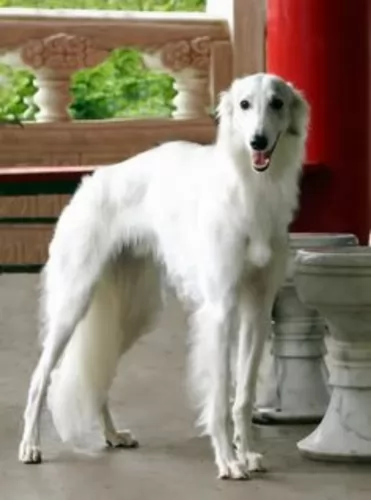 The Silken Windhound is a breed intentionally developed by Borzoi and Deerhound breeder, Francie Stull. Although the first litter of the Windhoud was not born until 1995, their development began in discussions ten years later. Bred as a cross between her beloved Deerhounds and Borzoi, the first Society for the breed formed in 1999 and they were recognized by the UKC in 2011.
The Silken Windhound is a breed intentionally developed by Borzoi and Deerhound breeder, Francie Stull. Although the first litter of the Windhoud was not born until 1995, their development began in discussions ten years later. Bred as a cross between her beloved Deerhounds and Borzoi, the first Society for the breed formed in 1999 and they were recognized by the UKC in 2011.
Ms. Stull wanted another breed for her kennel and decided on a smaller sighthound than her Borzoi. She wanted a long coat, a good temperament, good health, and possessing the same athletic abilities, grace and poise as the sighthounds that are larger. She developed the Silken Windhound based on this vision.
With this in mind, the kennel purchased the pick of a litter from the American and English Borzoi Champion bitch, Stillwater Virginia Reel. This puppy was eventually bred to Stillwater White Lightning and produced puppy that was a blue brindle. This dog, Stillwater Kristull Peacock, had the coat, personality and structure that Ms. Stull wanted for the new breed. She was bred to Deerhound Windsprite Autumnal Xenon to form the foundation for the Silken Windhound.
Over time champion Borzoi were bred with multi-generation Whippet based dogs and small Whippet from coursing and show lines. Finally, all of this work was rewarded with an incredible little sighthound to fit in the line of sighthounds between the giant and large breeds and the smaller whippet type breeds.
The Silken Windhound lives today in 24 different countries. They take their place in hound competitions all over the world in obedience, lure coursing, and racing. They are a Limited Stake Breed in the ASFA and competed with 40 other dogs in 2010. Then they were accepted by the NOFCA or National Open Filed Coursing Association, also in 2010. Finally, in 2011 they were fully accepted by the UKC.
The Silken Windhound is recognized in addition to the UKC, by the Dog Registry of America, the Rarities Inc., the American Canine Association, the Kennel Club of Slovenia, the American Pet Registry, Inc., the International Silken Windhound Society and the International, All-Breed Canine Association of America.
The Tweed Water Spaniel is extinct. Fortunately, we have some beautiful dogs that come from this dog. It is involved in bringing about the Golden Retriever. They were athletic dogs from Berwick-upon-Tweed.
It was in 1816 that Richard Lawrence wrote of the origins of the Tweed Water Spaniel which is thought to have come from the Newfoundland dog. It is believed that huntsmen used these dogs to retrieve the ducks and geese they shot. This purebred dog wasn’t recognized by the American Kennel Club or the FCI.
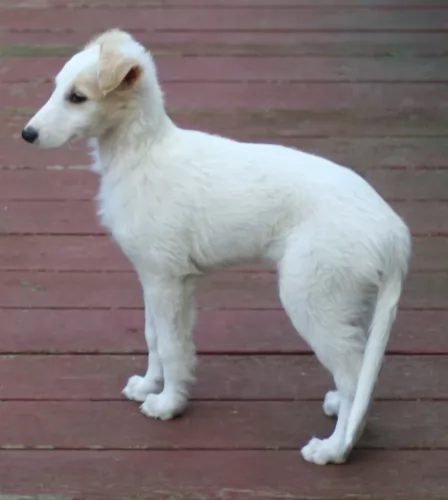 The Silken Windhound is a breed of beautiful, athletic medium sized dogs. They have the long coat, athletic build and classic lines of the sighthound/coursing dog. Just looking at them and you know they have strength, balance and grace in those medium sized bodies. Their running ability is exceptional. They perform well in the confirmation rings.
The Silken Windhound is a breed of beautiful, athletic medium sized dogs. They have the long coat, athletic build and classic lines of the sighthound/coursing dog. Just looking at them and you know they have strength, balance and grace in those medium sized bodies. Their running ability is exceptional. They perform well in the confirmation rings.
They are sine boned, balanced with smooth muscles – a sleek hardy looking dog. They have almond-shaped, large, dark eyes with small folded ears. Looking in their faces you see intelligence, friendliness and alertness. The head is long with a well balanced muzzle and a dark, slightly down-turned nose. Her lips are dark and full and her neck long and slender. The Silken Windhound must have a flexible loin because they have a gallop of double suspensions and are amazingly fast. A deep chest is also a must with a flexible, curving tail. Her legs are straight and long, as she is built for speed.
The Tweed Water Spaniel had a curly liver-colored coat with a long feathery tail and medium-sized floppy ears. It is thought that he was a large dog standing at between 50 to 60cm in height and weighing between 25 and 32kg.
The Tweed Water Spaniel, regarded as a moderate shedder, would have required being brushed from time to time.
The Tweed Water Spaniel had so many wonderful characteristics that made him a splendid family pet. He was smart and able to learn basic commands. He was also very playful and would have made a robust, playful friend for children.
They made gentle, loyal companions for their human family and wee able to get on well with other pets in the home. They would have got on well with other pets in the home too and it is believed that they were amicable enough to have been suited as a therapy dog.
They made good watchdogs too, being active and alert, just loving the outdoors. They’re well suited to life in the country or a home with a big garden and wouldn’t like to be cooped up on a small property in the city.
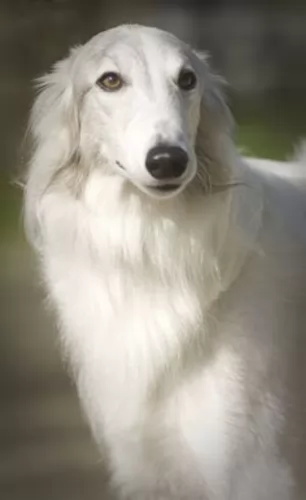 1. Children friendliness – they are great with children and would romp with them all day.
1. Children friendliness – they are great with children and would romp with them all day.
3.Adaptability Like most sighthounds they can be couch potatoes but being medium sized they can live just about anywhere as long as it is inside.
4.Learning ability - They are smart but their learning ability can be hampered by their stubbornness.
Intelligent, courageous and friendly, it seems such a pity that the Tweed Water Spaniel is extinct because he seemed to have been a super dog.
Luckily we have dogs such as the Golden Retriever that remind us of what a good family pet he was.
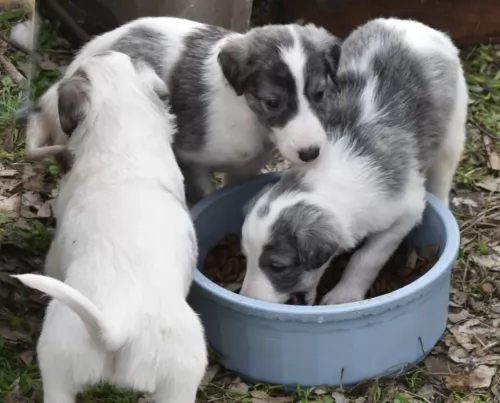 Most inherited diseases and conditions are rare. There is some drug related sensitivity, especially to ivermectin, and some dogs carry a MDR1 (multi-drug resistance gene) that is defective. Breeders are attempting to breed this out of the Silkens. A few other rare instances of concern include:
Most inherited diseases and conditions are rare. There is some drug related sensitivity, especially to ivermectin, and some dogs carry a MDR1 (multi-drug resistance gene) that is defective. Breeders are attempting to breed this out of the Silkens. A few other rare instances of concern include:
Because this dog is extinct and because no health records were kept, it is assumed that he would have had the same health issues as a Golden Retriever. Typical health issues of this dog would include hip dysplasia, obesity, cardiomyopathy.
This is a preventable disease in dogs, and if dog owners only knew what damage they do by allowing their dogs to become obese. Certainly, obesity shortens a dog’s life.
It is mind-boggling to realize that scientific evidence tells us that fat tissue is biologically active, secreting inflammatory hormones and also putting stress on the dog’s joints. Obese dogs develop an increased risk for cancer, diabetes and heart disease.
Dilated cardiomyopathy is a disease of the heart muscle characterized by an enlarged heart. The heart doesn’t function properly with the ventricles becoming enlarged. The muscle wall of the heart becomes thinner and this causes the heart to lose the ability to pump blood to the rest of the body.
Fluid can accumulate in the lungs. This can all lead to congestive heart failure. Your dog will battle to breathe, be panting and coughing, have an extended abdomen and may even collapse.
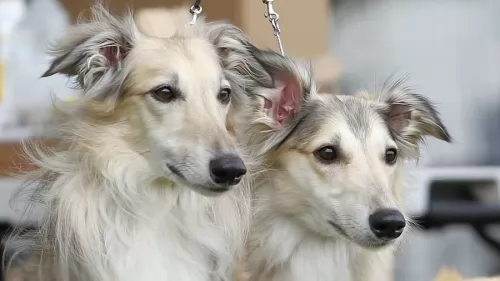 1.Feeding the puppy This is a medium sized, active breed. They need high quality dog food with plenty of protein. Feed them 3 times a day from a food made for high energy active medium sized breeds.
1.Feeding the puppy This is a medium sized, active breed. They need high quality dog food with plenty of protein. Feed them 3 times a day from a food made for high energy active medium sized breeds.
2.Feeding the adult - Feed them 2 times a day from a food made for high energy active medium sized breeds.
4. Games and Exercises The breed is active, and they love to run. They need daily exercise and they usually excel at flyball, agility, obedience and therapy. Obviously, they are very good at lure coursing and racing. They love to run or jog with you.
The Tweed Water Spaniel had floppy ears and as a water dog, he may well have had ear infections in his day. One wonders if dog owners of that time were aware of the need to have the inside of the dog's ears clean and dry.
The Tweed Water Spaniel would have needed to have his eyes checked too. Pus in the eyes could indicate the dog wasn’t well.
The Tweed Water Spaniel would have required a lot of exercise and would have loved long walks and hikes. He wouldn’t need an invitation to go swimming and if you threw a stick or ball into the water, he’d be right there, jumping right in.
If you were a person that thrived on an active life this dog would have been for you.
Nobody really knows what the Tweed Water Spaniel would have eaten in the 19th century when he was around. He’s the kind of dog you’d have to be careful with as he could put on weight easily.
If he were around today, you’d give him a high quality commercially manufactured food that was designed for large, active dogs. No doubt in those days, the owners gave the dog scraps off the table.
Today if you wanted to give your dog home-made food, you’d stick to healthy foods such as boiled chicken, brown rice or pasta and some healthy vegetables such as spinach, carrots and sweet potatoes.
Puppies would have required 4 bowls of food a day while the adult dog would require 2 meals a day.